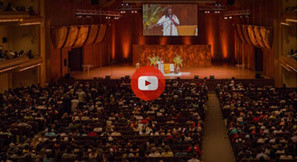
He is rejecting other schools of though and saying that, no system or method will lead you to enlightenment, and there is no such thing as enlightenment at all. Gurudev, is there really anything as enlightenment?
See, in this world, different people have different opinions and different views. They can have their views, but reality is different.
Somebody sitting in a desert might say, 'There are no trees on planet Earth'. That is their experience.
On the other hand, we say, 'Oh, there are so many tress. There is plenty of water, and the water is so sweet'. But that is not their experience. The water they have tasted is salty.
People are entitled to have their own perceptions.
If we say that there is no enlightenment, first we need to understand what enlightenment means? It means raising above the mind; becoming your natural self. It is not something that just falls on your head. Have the feeling that 'I am happy, come what may' is enlightenment.
If enlightenment is not there, then why have people from centuries spoken about it. It is not just one person's fantasy. For centuries people have had the very same experience that 'I am not the body'.
And yes, you do not have to read and read, and then you will get an experience. So many people have not read anything, but when they do Sudarshan Kriya, they have the same experience as someone who has read.
You should ask this person to come and do the Sudarshan Kriya and Shakti Kriya. Once he does Sudarshan Kriya, Shakti Kriya and some meditation, then he may understand.
I once heard a very famous person say, 'You cannot stop thoughts in the mind for even a second. If thoughts stop, then you will become crazy'.
This is not our experience! Is this your experience? What is your experience when you meditate here? For an extended period of time, your mind become calm, settled and serene; isn't it so? (Everyone says, 'Yes')
You experience a mind without thoughts! (Everyone says, 'Yes')
Today, this can even be measured using instruments. When there is total harmony and synchrony between the left and right hemisphere of the brain, and when the parasympathetic and sympathetic nervous system are working in harmony, then you say that this is an altered state of consciousness. And this altered state of consciousness which can be physically measured today, is what is called enlightenment.
Yoga and meditation is the only way.
Here everything is painful. Even an overdose of anything pleasant becomes painful.
Wanting something pleasant causes pain. After having gotten what you want, then also there is pain because there is a fear of losing it. And when it is gone, the memory of it gives pain.
Something unpleasant anyways gives pain right away. But the pleasant also gives pain because wanting or craving for something pleasant, is painful. This is what happens many times.
Someone wants to get into a ministerial post. Before getting into it, there is so much pain to get into the post. Once they get into the post, then maintaining it is painful. And then when they leave the post, then also there is pain, because no one respects them. But when you feel completely unattached to it, that is when the pain disappears.
That is why it is said, 'Tena tyak tena bhunji thah'.
Know that all this belongs to the Divine, so just let go of attachment and enjoy!
I am not saying that it is bad to get into a position, or bad to experience pleasantness, no! But you should be detached from it.
Who said that Buddha did not meditate? Meditation is sadhana!
Buddha also travelled to so many places and served the people. He listened to everyone's problems, and taught them meditation. Isn't this seva?
Who said he didn't do satsang? Every day they would sit and do satsang. All the Buddhist scriptures are from these satsang only. He sang and spoke in Pali (a Middle Indo-Aryan language).
He is the one who said, 'Bhavatu sabba mangalam, rakkhantu sabba devata' (May all beings be happy, and may all the Gods protect you).
In those days the language used was Pali, so whatever Buddha spoke and sang in Pali, is what has become the Buddhist scriptures today.
If you look at it that way, then you can say that Lord Krishna did do much. He recited the Bhagavad Gita.
In fact Lord Buddha did a lot. He meditated a lot, he fasted a lot. Whatever anyone told him to do, he did. After doing so much, when finally he got very tired, that is when he got enlightenment.
Buddha did a lot of sadhana. Krishna did not do much sadhana at all. He was mischievous; he did something here, and then he went and did something there. That is why it is called Krishna Leela (The Play of Krishna), and Buddha Katha (The Story of Buddha).
Ego is the tax for devotion.
While engaging in the world you should feel the freedom.
When you sit for meditation that is when you should completely disengage from the world. And when you come back to activity, then you should have keen awareness. Develop that mindfulness and keen awareness.










